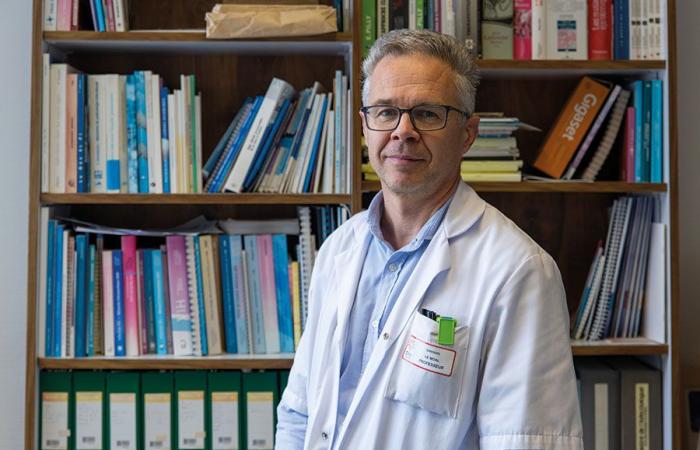
Professor Gwenaël Le Moal became head of the infectious and tropical diseases department in October 2024.
What was your professional background?
I studied medicine in Paris then my internship in the department of internal medicine, infectious and tropical diseases at Poitiers University Hospital. I chose this specialty because I am from the HIV generation and bacteria and viruses are fascinating beings. At the end of my internship, I did a clinic after which I obtained a position as a hospital practitioner. I officially became head of the department and associate professor of the department of infectious and tropical diseases which was split from internal medicine, on October 15, but I have held this position since July 2024 already.
Why did you accept this position?
I didn’t want to take this job. I agreed because if I didn’t do it, no one would. The service was in a negative spiral, without teachers and with few professionals. A year ago, there were only three of us. Infectious disease is a field that suffered greatly during the covid and post-covid period because we were on the front line. Several professionals have left this specialty which has also attracted fewer interns. The situation is gradually improving. I ended up accepting because colleagues made me understand that if I took charge of the department, they would follow me. It is pleasant to work with motivated people who want to work. This is what makes me say that it may be worth it, even if I have to sacrifice part of my clinical activity and the contact with patients that I greatly appreciate. Someone must be identified as the leader to decide when a decision needs to be made or to discuss things with management.
Tell us about the infectious and tropical diseases department?
The service has three hospital practitioners, doctors Jean-Marie Turmel, Diama Ndiaye and Sébastien Vingerhoets, a university professor-hospital practitioner, France Cazenave-Roblot, and myself who am an attached professor-hospital practitioner. A clinical manager is also currently in post. The service is made up of an inpatient unit which is currently going through a difficult period. Due to a lack of human resources, especially nurses, we went from 27 to 18 beds. We will strive to return to a number of 22 beds, which is the number necessary to cover our activity. We also have significant cross-functional activity on the proper use of antibiotics within the establishment, a subject on which we are rather proactive. We help the services by taking care of all patients with a positive blood culture with the help of the bacteriology laboratory. We are trying to develop our expertise to improve the use of antibiotics because resistant bacteria represent a public health issue.
We also have consultations according to centers of skills and expertise on different pathologies such as HIV, endocarditis, infections in immunocompromised people or osteoarticular infections. Thus, we work in close collaboration with other services such as cardiology, onco-hematology or orthopedics. We are a rabies reference center and international vaccination center, particularly for yellow fever, and soon a departmental vaccination center.
Tell us about this departmental vaccination center project?
The project is currently being finalized and should begin in the first months of 2025, with Dr. Valentin Giraud as coordinating practitioner. This is a project initiated by Professor France Cazenave-Roblot several years ago. It responds to a request from the Regional Health Agency because there is no vaccination center in Vienne. With the vaccination of adolescents against the papillomavirus, the project has made good progress. The creation of this vaccination center meets several objectives, the first being to vaccinate vulnerable populations outside the hospital, throughout the department, within structures such as the Georges Charbonnier relay. The center will also support the vaccination of immunocompromised patients for whom vaccinations are essential. This takes on its full meaning with the extension of the regional cancer center. The center will also have the mission of promoting health in conjunction with Professor Marion Albouy’s public health team. The office of the vaccination center will thus be located at Vie la Santé.
-What are your challenges as department head?
The first is that all service professionals are fulfilled; that they are happy to come to work every day. Fulfilled professionals produce quality work. We must take into account the way of working of young professionals who today have different priorities from those that were ours. We try to find other ways of working so that everyone benefits, while remaining demanding about the quality of our care.
Being a department head means listening and adapting. Just because I’m a department head doesn’t mean relationships should be condescending. Anyway, I have the privilege of age so I am listened to. I am lucky to be surrounded by people who wanted to work with me. This makes things a lot easier. I try to have a meeting once a week to meet the healthcare team. I am optimistic about our ability to work as a team. I like teamwork otherwise I wouldn’t work in the hospital.
Each of us must also have our own expertise even if we are obliged to know a little about all infectious diseases due to the constraints. We’re doing pretty well there. It will then be a question for me, as an associate professor, of supporting the students in their professional projects, both at the university and at the hospital. We are going to reintroduce bedside teaching which has been somewhat neglected in recent years. The only academic in the service, Professor France Cazenave-Roblot could not do it alone.
The last issue concerns our involvement in the research that we will develop in the years to come. We are thus participating in more fundamental research projects with the INSERM-U1070 PHAR2 research unit “Pharmacology of anti-infectives and antibiotic resistance” directed by Professor Sandrine Marchand.
Share the publication “Medical perspective: Gwenaël Le Moal, infectious disease specialist and head of the infectious and tropical diseases department”





